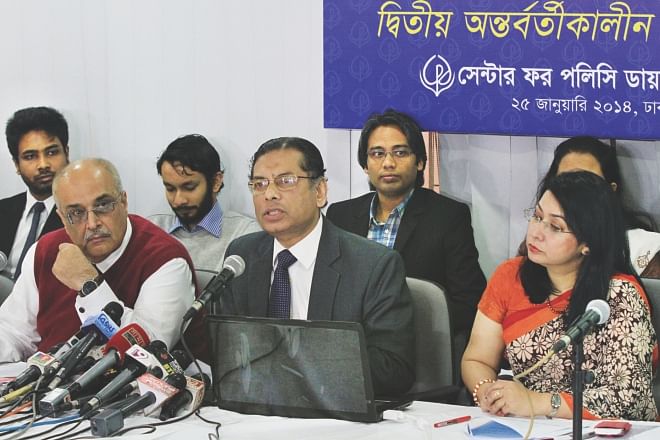Recipe to bolster economy
Recipe to bolster economy
CPD says fiscal targets will have to be readjusted as economy was battered by unrest

The Centre for Policy Dialogue yesterday came up with a host of suggestions for the government to revive the economy battered by months of political turmoil.
The think-tank, which termed the budget surreal when Finance Minister AMA Muhith unveiled it last June, said by the middle of the fiscal year it has become obvious that the fiscal goalposts need substantive readjustment.
It said the size of the annual development programme has to be reduced as the top 10 ministries, which account for 80 percent of the total allocation, have failed to reach their spending target in the first half of fiscal 2013-14.
The issue of ensuring quality of public investment will remain paramount, said Mustafizur Rahman, executive director of CPD, while unveiling an analytical review of Bangladesh's macroeconomic performance at his office.
Rahman said the government's borrowing from non-bank sources has already increased. "It will be important to keep bank borrowing within budgetary target."
Rahman appreciated the government's emphasis on large infrastructure projects, but cautioned that they might not yield immediate growth impulse.
CPD Distinguished Fellow Debapriya Bhattacharya said, in simple terms the availability of resources has lessened.
"Tax collection has gone down and the flow of foreign aid has decelerated. Besides, the availability of non-tax resources is also low. As a result, the squeezing of expenditure has become inevitable.”
He said the government would have to reconsider its expenditure priorities such as subsidy, as the country would require a lower level of subsidy this fiscal year. Revising down the subsidy budget would help keep expenditure within the capacity.
Bhattacharya said the government would have to provide all-out support to ensure boro cultivation, particularly timely supply of agriculture inputs and electricity, in order to support the rural economy.
Higher credit growth for the agriculture sector has to be maintained. Besides, the rural people and the businesses that have been affected have to be given support.
"If we cannot revive the rural economy then our economy will become weak in terms of growth."
The CPD said the government would have to take urgent steps to raise food stocks to the psychological comfort level of one million tonnes, as the current stock fell down to 0.951 million tonnes in December last year, which is 31 percent lower than that of December 2012 and 38 percent lower than that of December 2011.
Bhattacharya said the industries and the businesses would have to be given support from the government so they can recoup their losses.
The government has already announced a number of supportive policy measures for the private sector in view of its losses. The measures, however, are skewed towards the garment sector.
"The measures are fine. But it would not be economic justice if they only get the support while others are deprived," he said, adding that agro-based industries, transport, small entrepreneurs and businesses were equally affected.
Bhattacharya said a relatively peaceful situation is prevailing in the country, which will help resume the operation of the industries which were closed or not fully operational.
"If we want to expand the economy, we will have to remove the policy uncertainty."
The government will have to ensure total transparency and accountability about the mid-term projects being undertaken.
He said the government should hold discussions with social groups and organisations about major infrastructure projects, as initiatives such as river training and land acquisition will displace many people.
"Discussions will have to be held with the entrepreneurs and the businesses. Above all, the government will have to sit with the political rivals. If we do not do so, the uncertainty over major projects might persist in the longer run."
He said if any question over the durability of the government prevails then it would affect the investment climate.
"The uncertainty over political arena might not vanish completely until an all-inclusive, fair and transparent election is held. If the political uncertainty lingers then there will be confusion about long-term investment."
He also called for expanding the network of the social safety net programmes. "But we have to ensure efficient uses of resources and check leakage."
The CPD said the non-performing loan, which stood at 12.8 percent in September last year, was a matter of concern for the financial sector and warrants special attention from policymakers.
Citing recent scams in the banking sector, the research organisation said the central bank recapitalised the state-run commercial banks to the tune of Tk 4,100 crore in 2013 at the expense of taxpayers.
Rahman said the government should set up a special fund for helping affected sectors in the forms of incentives instead of imposing the burden on the banking sector.
CPD Research Director Fahmida Khatun and Additional Research Director Khondaker Golam Moazzem were also present.